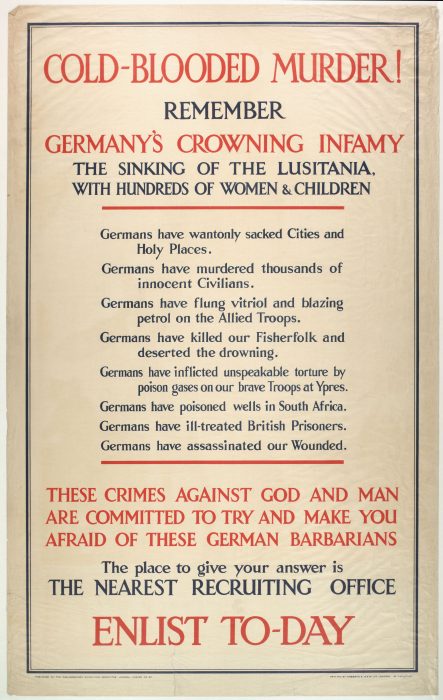Printed recruitment poster showing slogans regarding sinking of the Lusitania, 1915
Reference: SANT/GEN/MIL/3/1/28
Suggested age groups: KS3, KS4, Lifelong Learners
Subject areas: History, Literacy, Art
CONTEXT
At the beginning of the war, the British government relied upon volunteers to join the armed forces. Posters like this one were produced to try and persuade men. In the first few weeks of the war many men did join up, but by 1915 it was increasingly obvious that more were needed. In January 1916 conscription was introduced; men aged 18-41 were forced to join up.
The Lusitania was a ship carrying civilian passengers that was sunk by a German submarine on 7 May 1915. 1,193 people died and there was an international outcry. The sinking of the Lusitania is often credited as one of the reasons for America joining the war, although they did not do so until April 1917.
In England, the sinking was used to encourage recruitment, as can be seen here. It also sparked a series of riots across the country in which German businesses, particularly butchers’ shops, were targeted. In the North East, mobs violently attacked German butchers’ premises in South Shields, Sunderland, Blyth and Berwick on 15 May 1915.
ACTIVITIES
ACTIVITY 1
Background
At the beginning of the war, the British government relied upon volunteers to join the armed forces. Posters like this one were produced to try and persuade men. In the first few weeks of the war many men did join up, but by 1915 it was increasingly obvious that more were needed. In January 1916 conscription was introduced; men aged 18-41 were forced to join up.
SEE
See: Who did the British government rely upon to join the armed forces at the beginning of the war?
See: When did most men join the armed forces voluntarily?
See: When was conscription introduced?
See: What does conscription mean?
See: Who was forced to join the army due to conscription?
THINK
Think: What is the difference between enlistment and conscription?
Think: Why were not enough men volunteering to join the army?
Think: Why did the government only conscript men between the ages of 18 and 41?
Think: Were any men between the ages of 18 and 41 exempt from conscription?
Think: What did conscription mean for the role of women in Britain?
Think: What was the British public’s opinion on conscription?
DO
Do: Create a propaganda poster promoting conscription.
Do: Create a political cartoon showing British attitudes towards conscription.
Do: Write a speech as though you are a military spokesperson to encourage men to join the army.
Do: Research the types of people who were exempt during conscription. Create a diagram showing why they may have been exempt.
Do: Using testimonies from the Imperial War Museum website, write a monologue from the perspective of someone who has decided to enlist.
Do: In pairs, script a conversation between a father and son who are both considering joining the army after seeing the Lusitania propaganda poster.
Resources
https://spartacuseducational.com/FWWconscription.htm
http://www.eastsussexww1.org.uk/attitudes-towards-conscription/index.html
https://www.bbc.co.uk/bitesize/topics/zqhyb9q/articles/z4v9mfr#
http://www.bbc.co.uk/history/british/britain_wwone/women_combatants_01.shtml
https://www.iwm.org.uk/history/voices-ofthe-first-world-war-joining-up
ACTIVITY 2
Background
The Lusitania was a ship carrying civilian passengers that was sunk by a German submarine on 7 May 1915. 1,193 people died and there was an international outcry. The sinking of the Lusitania is often credited as one of the reasons for America joining the war, although they did not do so until April 1917.
In England, the sinking was used to encourage recruitment, as can be seen here. It also sparked a series of riots across the country in which German businesses, particularly butchers’ shops, were targeted. In the North East, mobs violently attacked German butchers’ premises in South Shields, Sunderland, Blyth and Berwick on 15 May 1915.
SEE
See: What was the Lusitania?
See: What happened to the Lusitania?
See: What effect did the sinking of the Lusitania have on Britain?
See: What is the purpose of this poster?
THINK
Think: What is propaganda?
Think: How was propaganda used during WW1?
Think: Why was the sinking of the Lusitania used as propaganda?
Think: Why did the sinking of the Lusitania spark riots?
Think: What impression does the poster give of German people?
DO
Do: Annotate the poster to show the different linguistic devices used to persuade the reader to enlist.
Do: Does propaganda always tell the truth? Fact check the statements made by the poster. How accurate are the statements made by the poster?
Do: Write a list of the ways that propaganda is shared today.
Do: Create a propaganda meme to show how soldiers could be recruited today.
Do: Create a poster to show the ways that German submarine warfare impacted civilians.
Do: Research the sinking of the Lusitania. In groups debate whether it was right for German submarines to attack civilian and merchant vessels. Think about what the Geneva Convention said about the rules of international warfare at the time.
Resources
https://literarydevices.net/propaganda/
https://www.bbc.co.uk/bitesize/topics/zqhyb9q/articles/zhw3jhv
https://www.walesonline.co.uk/news/local-news/how-propaganda-pressed-home-world-6068239
https://encyclopedia.1914-1918-online.net/article/propaganda_media_in_war_politics
https://www.theguardian.com/media/2017/mar/11/death-truth-propaganda-alternative-facts-gripped-world
https://www.icrc.org/en/document/10-things-rules-of-war-Geneva-Conventions
https://www.technologyreview.com/2019/10/24/132228/political-war-memes-disinformation/
OTHER ONLINE RESOURCES
Lusitania website, includes list of casualties and other resources: http://www.rmslusitania.info/
Short summary of Lusitania attack and aftermath, Imperial War Museum: https://www.iwm.org.uk/history/18-minutes-that-shocked-the-world
Submarine warfare, including sinking of Lusitania, eye-witness accounts, Imperial War Museum: https://www.iwm.org.uk/history/voices-of-the-first-world-war-the-submarine-war
Tyne and Wear Archives, photographs of captured German submarine, Flickr: https://www.flickr.com/photos/twm_news/albums/72157633570788096
WW1 propaganda, articles and videos, British Library: https://www.bl.uk/world-war-one/themes/propaganda#
Recruitment, eye-witness accounts, Imperial War Museum: https://www.iwm.org.uk/history/voices-of-the-first-world-war-joining-up
Gas attack at Ypres, eye-witness accounts, Imperial War Museum: https://www.iwm.org.uk/history/voices-of-the-first-world-war-gas-attack-at-ypres
Northumberland Archives blogs about “enemy aliens”:
https://northumberlandarchives.com/test/2016/01/13/aliens-at-woodhorn/
https://northumberlandarchives.com/test/2019/05/23/enemy-aliens/
https://northumberlandarchives.com/test/2019/07/17/north-east-aliens-friend-or-foe/


